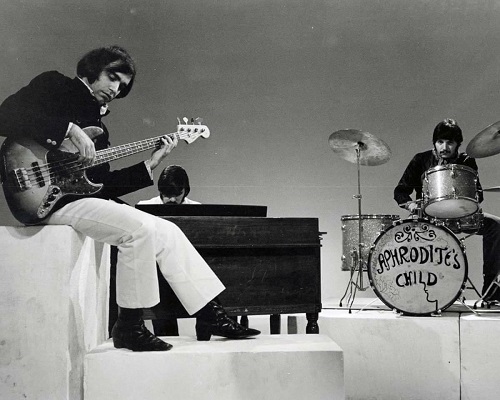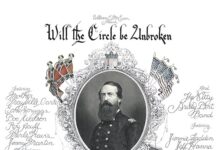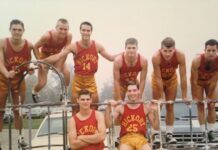Photos courtesy of Rosmarie Kaiser
One of the greatest singers to ever grace the planet never had a Top 40 hit in America.
While you’re likely to be more familiar with his one-time bandmate and Greek musical contemporary Vangelis, Demis Roussos was a literal giant of popular music; a bearded bear of a man with a voice, stature and demeanor that could effortlessly shift from prog rock to Pavarotti. While the celebrated global singer tragically passed away nearly five years ago, his impact and presence should still be felt to this day.
“He whistled beautifully when happy and it was a pleasure to listen to him,” former wife Pamela Roussos Ratiu told me recently. “He had a sort of charming Zorba the Greek attitude towards life.”
“He was a true lover of life with a soul as pure as a child’s, behind appearances,” adds daughter Emily Roussos.

In the realm of popular music, Roussos stands out for several reasons:
- The fact that on stage he had a brooding intensity with a fierce stare all while maintaining a soaring vibrato with just a trace of rasp.
- The fact he essentially put Vangelis on the map while both were members of the highly underrated psychedelic prog-rock group Aphrodite’s Child.
- The fact that even at 300 pounds and clad in airy kaftans, he could make women swoon and win audiences the world over.
- The fact that even though he was known as a singer, his bass playing was quite unique as well.
While U.S. success would prove elusive for Roussos, it doesn’t change the fact he was and still remains a powerhouse universal figure. One that could command a recording studio, a music video, or stage after stage after stage.
“Demis was global partially due to the fact that he spoke eight languages and therefore could record and perform in various languages,” Ratiu said. “Demis had a falsetto voice. He had hoped to study opera when he was younger but his family could not afford it. He also had this deep husky voice that would have suited jazz. He was quite versatile.”
“On stage Demis was a true professional. I believe he gave his all to his fans at public appearances, and he enjoyed performing,” she adds. “There was another side of Demis during those performances which was unique. He was also easy to adapt to situations (with) comedy quickly (coming) when performing.”

In speaking with family members, I came to learn several other interesting facts about this underrated musical figure. According to daughter Emily he discovered he could sing “quite late” after he was required to fill the post left by a cousin who was sick and couldn’t perform.
“He once told me that this specific sensation he had at that moment was something he had never felt before and that from then on he felt that his life would never be the same again,” she told me.
For me, my fandom began with listening to Aphrodite’s Child’s seminal 1972 conceptual masterwork 666, a trippy listening experience that borrows from the Book of Revelation and somehow encapsulates the world’s discord and torment in the era of Vietnam. The album is a must-listen for rock fans and a personal favorite of mine, so much so I willingly shelled out $40 to a record store in Burlington, Vermont for a worn vinyl copy of the album – not caring if it could actually play (it can).
Magical, charismatic, timeless, fun — these are all additional words used by loved ones to describe Roussos as a performer and person. In the case of this column, my goal is to offer a 101 chronological primer of Roussos’ most standout tracks (both band and solo) that encapsulate all these qualities and more. The goal is to ultimately prompt a “rediscovery” period for this titan of artistic talent.
1. “Rain and Tears” (1968)
Classically driven as its melody comes courtesy of Pachelbel’s Canon, this harpsichord-fueled track establishes Roussos as a strong vocal presence, wavering between octaves while demonstrating an individualistic sense of emotionality and vulnerability. At times, you expect his voice to break but it never does, only cementing its overall beauty.
2. “It’s Five O’ Clock” (1969)
Consider this track Aphrodite’s Child’s version of “A Whiter Shade of Pale” as Roussos begins his vocals timidly and escalates to powerhouse while Vangelis’ organ notes hit similar plateaus. Evocative and plaintive all at once, this is arguably the only Roussos track without a trace of roughness in his voice. His voice here sounds as if it could shatter mountains.
3. “We Shall Dance” (1971)
A major worldwide hit for Roussos, this pays tribute to Roussos’ Greek roots and sensibilities, with “Oompa” stamped all over it.
4. “Babylon” (1972)
A standout track on Aphrodite’s Child’s 666 album, this song not only showcases the breadth of Rousso’ vocals but also his influential thumping bass playing. This is arguably the most “rock” song Roussos has ever put forth as he’s singing at a speed faster than typically known for.
5. “The Four Horsemen” (1972)
Entirely trippy yet infectious at the same time, this is one of 666’s strongest instrumental workouts as the song epitomizes the core colorful elements of the Book of Revelation. Hearing Roussos’ rattle off the lyrics in his seductive serpent-like tenor is an experience unto itself as he shapes and bends notes like a shaman until rock instrumentation enters the fold.
Per Emily Roussos: ““The Four Horsemen” remains up until today a singular item for any music purist.”
6. “Forever and Ever” (1973)
Soft and sentimental, this track paints Roussos as music’s most underrated teddy bear.
7. “That Once in a Lifetime” (1978)
Another standout ballad from Roussos. The distinction behind this song though is the fact it’s his only American chart entry, barely missing the Billboard Top 40. The song would be released on Roussos’ eponymous 1978 album, a unique effort within his collective discography, especially given song Number 8.
8. “L.O.V.E. Got a Hold on Me” (1978)
Demis embraces disco mania following a move to Los Angeles to make further inroads in the U.S. This is the kind of song Casablanca Records would have salivated over as Roussos’ velvety style, combined with lush string instrumentation and undeniably hooky dance beat make for an overall fun listen.
Per Emily Roussos: “I know he enjoyed working with that talented crew … doing something he would invest more [in] artistically, and not [per] a specific label’s request. This was always a very important matter to him as an artist.”
9. “Race to the End” (1981)
While Roussos and his one-time bandmate Vangelis would go on to have two very distinctive careers, their influence on each other would shine through time and time again. Here, Roussos lends vocals to Vangelis’ “Chariots of Fire – Titles” theme, one of the more defining songs of the 1980s and an Oscar winner to boot. Without provocation, Roussos puts to words the emotion and drive that helped take Vangelis’ instrumental to the top of the charts worldwide. It’s just a shame this vocalized version of the track never made it into the actual film.
10. “Follow Me” (1982)
Grandiose in its scope and execution, this track is arguably Roussos’ greatest achievement. Hearing Roussos’ voice steadily climb octaves until it’s all but breaking glass is one of the most fascinating listening experiences I’ve ever encountered. I would go so far to say it practically rivals Rainbow’s “Stargazer” where diminutive Ronnie James Dio goes toe to toe vocally with an entire philharmonic orchestra and never once falters. Watch any video of Roussos singing this track and try not to be intimidated by the intensity and power behind his eyes.
***
Share your feedback and suggestions for future columns with Ira at vinylconfessions84@gmail.com.




















